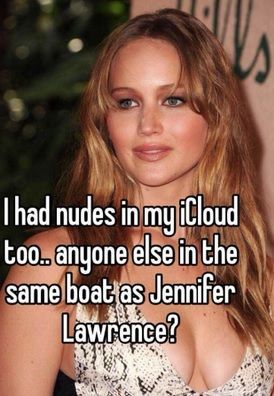The Jennifer Lawrence Nude Photo Leak Spurs Empathy From The ‘Whisper’ Community

Celebrities: they’re just like us. Except when they aren’t. But even then, they are.
After Reddit and 4chan hackers exploited a vulnerability in iCloud’s security and leaked hundreds of private, nude photos of Hollywood heavyweights -- all women -- to the public, a flood of non-famous users took to their preferred social media echo chambers to tell their followers (and, we suppose, themselves) that this most grandiose pedigree of public humiliation could never happen to them. The non-famous are private citizens, they claimed, but celebrities are different. Celebrities surrendered their right to delineate private spaces the moment they chose to pursue millions of dollars under the insatiable, finicky auspices of the public eye.
The non-famous, they contend, have every right to gawk at the spoils of what -- for them or any of the non-famous people in their lives -- would amount to a serious violation of personal space. But since celebrities don’t have any claim to personal space, there can be no breach of privacy. The logic here is as twisted as it is pervasive.
Moreover, it’s incorrect. This vulnerability in iCloud security doesn’t just affect celebrities: It has deeper implications for anyone who has ever kept anything vulnerable in the digital space. We may not all be actively hunted by hackers, but we are all unwitting exhibitionists.
The prevailing tenor of discourse in the Whisper community is different. By design, the story-sharing app cultivates a distinct, meaningful space in the ever-expanding landscape of social media by affording its users complete and total anonymity in contrast to the more traditional social media forms of pseudonymity. It’s no surprise, then, that users concerned about their privacy, or the privacy of the information they actively share, would see the value of Whisper for having sustained, meaningful discussions without ever revealing one’s identity.
We’ve collected some of the most compelling Whisper stories about what this iCloud security vulnerability and the ensuing breach-and-leak of celebrity nudes means for the average internet dweller. Some members of the community are just now realizing how much of their sensitive information is stored “out of sight, out of mind” on the digital cloud. Others were spurred to turn off some of the features automatically enabled on their smartphones which hackers can exploit.
But many confessions were strongly in support of the privacy for the celebrities involved in the massive leak. A lot of the photos were first found on Reddit, a site that’s home to many advocates of net neutrality and privacy following the Edward Snowden leaks regarding NSA’s spying. Whisper users believe that privacy advocacy should extend to celebrities. The sense of shame or guilt for some users who believe themselves to be complicit in an illegal act was enough to stop any viewing of these nude celebrity photos.
As Scott Mendelson explained in Forbes, “Ms. Lawrence and the other victims have absolutely nothing to apologize for in terms of the contents of the photos or the nature in which they were leaked. The story itself should not be addressed as if it were a scandal, but rather what it is: A sex crime involving theft of personal property and the exploitation of the female body.”
Of course, there were some users who didn’t think twice about looking at the photos. Though they felt guilty after the fact, the act was already committed.
Check out the Whisper reactions to hackers leaking Jennifer Lawrence, Kate Upton, Kirsten Dunst, and Ariana Grande’s photos here:
[Whisper’s team uses a back-end managed certification system to ensure the veracity of these stories. Check the app out here.]
© Copyright IBTimes 2025. All rights reserved.






















